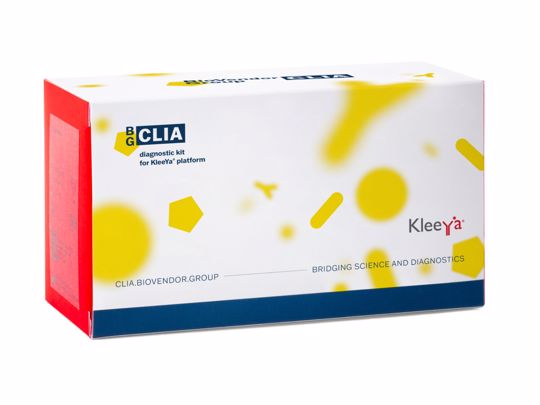CLIA Adiponectin
The chemiluminescence assay is intended for the diagnosis of metabolic disorders using adiponectin determination in human serum in the general population.
The chemiluminescence assay is intended for the diagnosis of metabolic disorders using adiponectin determination in human serum in the general population.
| Catalog Number: | CL-ADP050 |
|---|---|
| Size: | 50 tests |
| Regulatory status: | CE IVD |
| Clinical topic: | Diabetes & Metabolism Disorders |
| Diagnostic panel: | Metabolic Syndrome Panel |
| Producer: | TestLine Clinical Diagnostics s.r.o. |

Adiponectin and leptin are among the most important adipokines produced by adipose tissue. These hormones not only act as signaling molecules in energy metabolism but also play a key role in regulating inflammatory processes, insulin sensitivity, and the development of cardiometabolic diseases. Their circulating concentrations and mutual ratio serve as valuable biomarkers for the early detection of metabolic dysfunction and the risk of developing type 2 diabetes or cardiovascular disease.
Adiponectin – a protective adipokine with antidiabetic and anti-inflammatory effects Adiponectin is a hormone produced by adipose tissue that protects blood vessels and helps reduce inflammation. Unlike leptin, its circulating levels decrease as visceral fat increases. Low adiponectin levels are associated with:
Adiponectin promotes fatty acid oxidation in the liver and muscles, reduces the production of TNF-α and other pro-inflammatory mediators, and improves insulin sensitivity. For these reasons, it is considered one of the strongest protective factors for metabolic health.
Adiponectin-to-leptin ratio (Adpn/Lep) – a comprehensive marker of adipose tissue function The Adpn/Lep ratio has emerged as a sensitive indicator of adipose tissue dysfunction and metabolic imbalance. It reflects the balance between the protective and risk-associated effects of adipokines.
Given their role in the pathogenesis of insulin resistance and atherosclerosis, adiponectin and leptin are increasingly recommended as complementary biomarkers for patients with obesity, prediabetes, and cardiometabolic risk.
| Assay time | 15 min |
| Assay stability | 30 days on board stability / In use stability until the expiration date at storage temperature 2-8 °C |
| Sample matrix | Serum |
| Sample volume | 13 µL |
| Sample stability | 7 days at 2-8 °C, 24 months at -20 °C |
| Measuring range | 25 – 800 ng/ml |
| Assay/kit content | Reagent Cartridge with specific reagents for the assay, magnetic particles, calibrators |
| Complementary products | Anchor® Tips, Stackable Cuvette, KleeYa Trigger Pack, KleeYa Wash buffer |
| Note | The kits are CE-IVD certified and intended for professional use. |